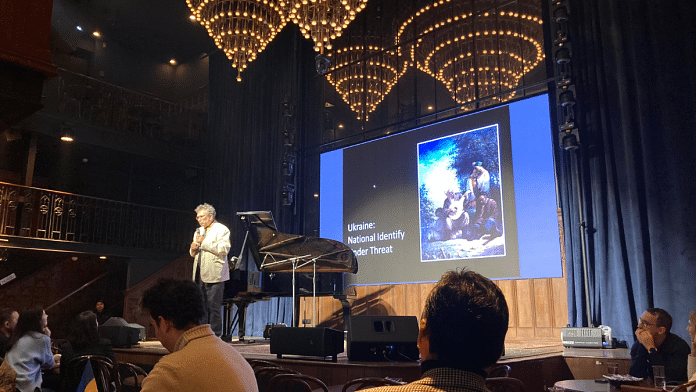New Delhi: Music is a powerful shield against the sword of Russian aggression, renowned Ukrainian pianist Taras Filenko told an audience of about 150 people at the Piano Man Jazz Club in New Delhi Saturday. The ethnomusicologist performed a variety of pieces by Ukrainian composers—with a mission to raise awareness about a country currently under subjugation in various forms.
For Filenko, music and art have always been tools to resist the “cultural subjugation” of Ukrainians—under Imperial Russia, the USSR, and now, Russian President Vladimir Putin’s “special military operation” that began on 24 February 2022.
Since the start of the war, Filenko has been performing Ukrainian folk music across the world to raise awareness of the country’s culture around the world.
“For every country that has been oppressed or suppressed or colonised, the oppressor very often bans language and written language. What is left? Only the oral tradition, which is, very often, the most intensely consumed form of art. I think that music can be such a form of resistance,” Filenko told ThePrint after the performance.
The audience, consisting of the Ukrainian diaspora, foreign diplomats, including the ambassador of Poland to India, were witness to a medley of music composed by Ukrainian composers such as Mykola Lysenko, Kozak Mamay, Yakiv Stepovy, Levko Revutsky, and Viktor Stepurko.
“[While] music conveys historical records, it has an emotional value and strength. It is an abstract art that can exist even under pressure. Music has become even more crucial in this type of war—not a physical war but an ideological war,” Filenko said.
Also read: There’s a new way to study US-China divorce. Memes
‘A mission to spread awareness’
For Filenko, it has become a mission to perform Ukrainian music wherever the opportunity arises—be it at a church, class, or concert. “It is a very fine line. At some point, Ukrainian music had almost been erased because the language was banned, music was banned, printed press was banned, plays and drama were banned. It was only a few individuals who managed to withstand and sustain this culture,” Filenko said.
For the musician, the continuation of culture is important, as across time and space, dominant powers have often exerted the “pressure” to erasure native traditions.
“Maybe one or two individuals can withstand this pressure. This is why I play the composers I do [Lysenko] because very few individuals like him could not only preserve their own talent—he wrote over 40 volumes of music—but he also started a school,” Filenko explained.
And to preserve culture, an “extremely fragile institution” according to the musician, it’s important to pay close attention to the “lineage” of music. “It consists of you, her, and me; maybe there will be many concerts [promoting the culture], but it depends on the artist. This is why I play these composers to show that the lineage has not ended.”
The musician is also at variance with the Russian President when it comes to interpreting the history of Ukraine. The country’s history can be traced back to the 9th-century state Kievan Rus, which had Kyiv as its capital.
“Russians, Ukrainians, and Belarusians are all descendants of Ancient Rus, which was the largest state in Europe,” Putin argued in his essay from 2021, further adding that Slavic tribes from the Baltic Sea to the Black Sea made this common space home.
However, for Filenko, the culture of the state was more diverse—it was shaped by the extensive and intensive interaction between the region’s native tribes and Asian communities, including those in China and perhaps the Indian subcontinent as well.
“The bandura [a Ukrainian musical instrument] has a very mysterious history…because the bandura mode and the Indian raga mode happen out of the blue in Ukraine. It became such a predominant element [in Ukraine] that it became almost like a folk tradition,” said Filenko.
The musician added that music from the bandura transcends to the spiritual, similar to the “immersive spiritual experience” of Indian music, potentially showcasing the historical link of Ukrainian culture with those from the East.
(Edited by Humra Laeeq)



